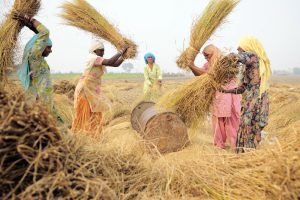Farmer unions in the northern Indian state of Punjab are angry with the Narendra Modi government. The sudden ban on wheat exports last month has hit the farmers hard. Farmers in Punjab, which is known as the bread basket of India, were expecting to benefit from high global wheat prices due to the war in Ukraine. (The Russia-Ukraine region is a major supplier of wheat to global markets.) However, that has come to naught.
The Modi government’s surprising U-turn on wheat exports came within a month of Food and Consumer Affairs Minister Piyush Goyal’s lofty assurances. “Our farmers have ensured that not just India but the whole world is taken care of,” Goyal said in April.
With global markets in shock and global wheat prices skyrocketing, India has been going all out to defend its export ban. At the ministerial meeting on Food Security at the United Nations, India’s junior Minister of External Affairs V. Muraleedharan said that India “recognized the sudden spike in global prices of wheat which put our food security and those of our neighbors and other vulnerable countries at risk.”
The “course correction,” as experts have pointed out, was required due to the Agriculture Ministry’s inaccurate estimates of its own wheat production. India’s wheat production this year could be lower than 100 million tonnes, a sharp fall from the initial estimates of a record production of 111.3 million tonnes. In fact, India had made bold claims of increasing exports to 10-15 million tonnes this financial year.
However, the severe heat wave in March across north India affected the crop output. What alarmed the government further was that its procurement of wheat needed for its public distribution schemes was at an all-time low; hence the sudden brakes on exports. Faced with intense international criticism, the Indian government eased restrictions on exports to “vulnerable” countries in its neighborhood, including Bangladesh and Sri Lanka.
Sociologist Yogendra Yadav, who is leader of the Jai Kisan Andolan, a farmers’ rights group, rejects the government’s rationale for the ban. “Wheat prices crashed after the announcement of an export ban, which meant a loss to farmers already hit by a heat wave that has reduced crop yield,” Yadav said. “At the same time changes in the ban order meant exporters could continue to export and profit (from high international wheat prices),” he added, accusing the Modi government of only looking after the interest of big businesses, corporates, and mill owners and “not the ordinary farmer.”
Opposition parties have rallied with farmers and slammed the government’s knee-jerk reaction. Shiromani Akali Dal chief and former deputy chief minister of Punjab Sukhbir Singh Badal demanded an immediate withdrawal of the export ban.
“A fall in demand will have a negative spiral impact on the entire economy,” Badal said, adding that while “farmers and farm laborer will be the worst sufferers” of the decision, “no economic segment nor any section of society will escape its negative short-term and long-term consequences.” He also questioned why the government did not bail out farmers reeling from losses the way it bailed out the manufacturing and industrial sector.
The political fallout of the ban has been swift. Farmers are a powerful lobby in an agrarian economy like India. A yearlong intense agitation by farmers had forced the Modi government to repeal three farm laws last year.
Several parties, including the Left parties and the Congress, condemned the wheat ban, describing it as “anti-farmer.” Senior Congress leader and former Finance Minister P. Chidambaram told the Hindu Business Line that the ban “deprives the farmer of reaping the benefits of higher export prices. It is an anti-farmer measure and I am not surprised as this Government has never been very friendly to the farmer.”
Farmers are already angry with the Modi government for not fulfilling the promises it made to them to get them to end their protests; the wheat ban is yet another blow. Yadav has said that farmers will be renewing their agitation for higher Minimum Support Price (MSP) for all crops.
Farmers, he said, have consistently been demanding “a law guaranteeing higher MSP based on actual costs.” But their pleas have fallen on deaf ears. Not only has the government failed to withdraw cases filed against farmers, it has also not set up a committee to solve the MSP issue. It is not surprising that farmers have resolved to resume their agitation.
An official from India’s Ministry of Commerce and Industry told The Diplomat via email that farmers were benefitting from market prices in excess of the MSP. “Wheat farmers across the country benefitted from the higher market rates as most of the farmers sold their produce to private traders at a higher market rate in comparison to the MSP,” the official said. “…The market prices of wheat remained continuously higher than the MSP throughout the procurement period… Thus, it is wrong to suggest that the export ban caused a loss to farmers.”
The official added that India’s government “has regulated wheat export… in order to ensure domestic food security as well as to prevent hoarding by a few rich nations & to take care of actual needy and vulnerable countries.”
Even if India’s argument of protecting its food security is understandable, a similar flip-flop marked its earlier COVID-19 vaccine policy as well — lofty boasting about supplying the world followed by a ban on exports.
As journalist Suhasini Haidar argues, the “flip flop undermines India’s international credibility,” which affects its global image and the power and influence it exerts in the world order.
This article has been updated to provide comment from India’s Ministry of Commerce and Industry.

































